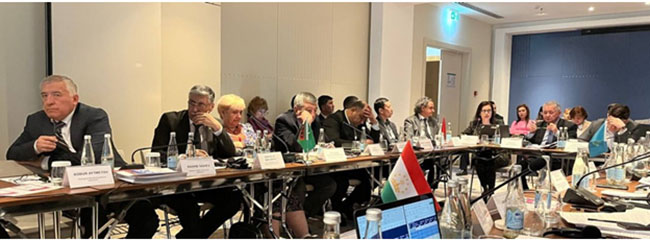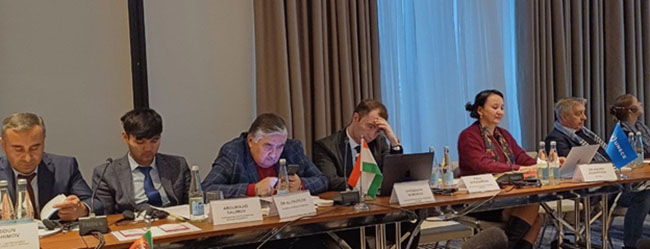No. 7 (531) February 2025 г.
РЕГИОНАЛЬНЫЙ СЕМИНАР ПО ПОКАЗАТЕЛЮ 6.5.2 ЦУР
12–13 февраля 2025 года в Ташкенте состоялся Региональный семинар по результатам третьего цикла отчетности по показателю 6.5.2 ЦУР и обмену опытом использования отчетности как инструмента для развития трансграничного сотрудничества в Центральной Азии. Семинар организован Международным центром оценки вод в сотрудничестве с ЕЭК ООН, ЮНЕСКО и НИЦ МКВК при поддержке GIZ.
В семинаре приняли участие представители государственных органов в области поверхностных и подземных водных ресурсов, окружающей среды, международных и региональных организаций и экспертов из Казахстана, Кыргызстана, Таджикистана, Туркменистана и Узбекистана.
В ходе сессии «Прогресс и проблемы в достижении показателя 6.5.2 ЦУР» были представлены результаты третьего цикла отчетности по показателю 6.5.2 ЦУР на глобальном и региональном уровне, выявлены ключевые пробелы и препятствия в достижении показателя в Центральной Азии, включая недостаток координации между странами и нехватку информации о трансграничных водных ресурсах, а также обсуждены взаимосвязи между показателями 6.5.1 и 6.5.2.
В рамках обсуждения регионального опыта трансграничного водного сотрудничества были представлены доклады стран региона о ключевых достижениях и сложностях в подготовке отчетности, подчеркнута важность институционального укрепления для трансграничного водного сотрудничества и отмечена необходимость совершенствования обмена данными. Рассмотрен вклад региональных организаций в достижение показателя 6.5.2 ЦУР. Подчеркнута необходимость развития партнерств между странами и привлечения международных организаций для финансирования и технической поддержки.

На семинаре был представлен международный опыт и лучшие практики из Европы, Африки и Южного Кавказа, включая сотрудничество Армении и Грузии по мониторингу водных ресурсов бассейна Храми-Дебед, регулирование водных ресурсов Сенегала и Мавритании на основе отчетности по показателю 6.5.2 ЦУР, а также опыт Франции и Польши в трансграничном водном сотрудничестве.

Одной из ключевых тем семинара стало управление трансграничными подземными водами, их учет в показателе 6.5.2 ЦУР и интеграция в процесс сотрудничества. В частности, были представлены глобальный опыт мониторинга подземных вод (ЮНЕСКО, IGRAC), региональные примеры, включая Приташкентский трансграничный водоносный горизонт, вопросы совместного управления поверхностными и подземными водами.

НИЦ МКВК принял активное участие в семинаре, выступая как соорганизатор и ключевой экспертный центр по вопросам водного сотрудничества в Центральной Азии. В рамках третьей сессии директор НИЦ МКВК Д.Р. Зиганшина представила доклад о роли организации в содействии трансграничному водному сотрудничеству и отчетности по показателю 6.5.2 ЦУР. В сессии по инструментам для разработки соглашений она представила доклад о финансировании трансграничного водного сотрудничества и возможностях привлечения дополнительных источников.
По результатам обсуждений на семинаре будут подготовлены практические рекомендации и предложения по усилению трансграничного водного сотрудничества.
Подробная информация о мероприятии доступна по ссылке